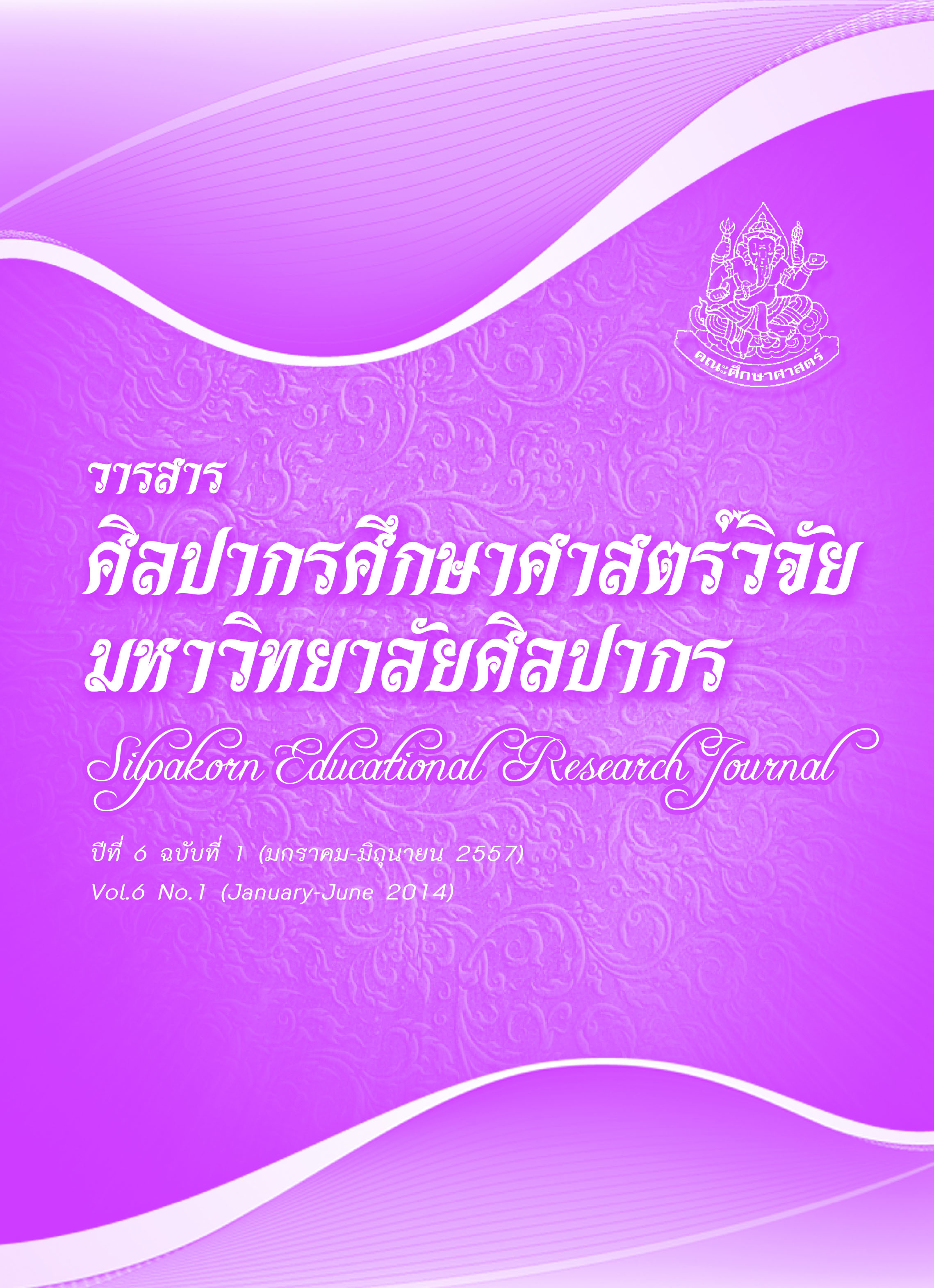การนิเทศแบบเพื่อนช่วยเพื่อนเพื่อพัฒนาสมรรถภาพการจัดการเรียนรู้เฉพาะบุคคล ของครูผู้สอนนักเรียนที่มีความบกพร่องทางสติปัญญา
คำสำคัญ:
การนิเทศแบบเพื่อนช่วยเพื่อน สมรรถภาพการจัดการเรียนรู้เฉพาะบุคคลบทคัดย่อ
การวิจัยครั้งนี้มีวัตถุประสงค์เพื่อ 1) เปรียบเทียบความรู้ความเข้าใจของครูเกี่ยวกับการนิเทศแบบเพื่อนช่วยเพื่อน 2) เปรียบเทียบสมรรถภาพของครูด้านความสามารถในการจัดทำแผนการจัดการศึกษาเฉพาะบุคคล แผนการสอนเฉพาะบุคคล และศึกษาความสามารถในการจัดการเรียนรู้เฉพาะบุคคล 3) ศึกษาความคิดเห็นของครูที่มีต่อการจัดการเรียนรู้เฉพาะบุคคล และการนิเทศแบบเพื่อนช่วยเพื่อนd4) ศึกษาผลการเรียนรู้ตามแผนการจัดการเรียนรู้เฉพาะบุคคล และ 5) ศึกษาพฤติกรรมขณะเรียนของนักเรียนdการวิจัยนี้กลุ่มตัวอย่างdคือ ครูผู้สอนจำนวน 5 คน และนักเรียนชั้นประถมศึกษาปีที่d4-5 โรงเรียนสุพรรณบุรีปัญญานุกูล จังหวัดสุพรรณบุรีd48dคน เครื่องมือที่ใช้ ได้แก่dแบบทดสอบdแบบประเมิน แบบสังเกตdและแบบสัมภาษณ์ การวิเคราะห์ข้อมูลใช้ ค่าเฉลี่ย ( ), ค่าเบี่ยงเบนมาตรฐาน(S.D.),dค่า t-test แบบ dependent และการวิเคราะห์เนื้อหา (Content Analysis)
ผลการวิจัย พบว่าdครูผู้สอน 1) มีความรู้ความเข้าใจการนิเทศแบบเพื่อนช่วยเพื่อนหลังได้รับความรู้สูงขึ้นd2)มีความสามารถในการจัดทำแผนการจัดการศึกษาเฉพาะบุคคล แผนการสอนเฉพาะบุคคลสูงขึ้นdและมีความสามารถในการจัดการเรียนรู้เฉพาะบุคคลอยู่ในระดับดีd3) การจัดการเรียนรู้เฉพาะบุคคลเป็นวิธีที่เหมาะสมกับนักเรียนที่มีความบกพร่องทางสติปัญญาdและการนิเทศแบบเพื่อนช่วยเพื่อนช่วยพัฒนาการจัดการเรียนรู้ได้ดียิ่งขึ้น ด้านนักเรียนพบว่าผลการเรียนรู้ของทุกคนผ่านเกณฑ์ประเมินและมีพฤติกรรมอยู่ในระดับพอใช้
Thedpurposesdof this research were; 1) to compare teachers’ knowledge and comprehension in peer coaching; 2) to compare an instructional competency on Individualized Education Program, Individual Implementation Plan at teacher before and after receiving peer coaching, and to study individual instruction ability after received peer coaching; 3) to study opinions of the teacher on Individual Implementation Plan and peer coaching; 4) to study learning achievement of intellectual disability students by Individual Implementation Plan, and 5) to study behaviors of the intellectual disabilities students during the instruction. The sample of this study were 5 teachers teaching intellectual disabilities student, and 48 students grade 4-5 at Suphanburipanyanukul School, Suphanburi province. The instruments were test forms, evaluation forms, observation forms, and interview forms. The data were analyzed by using mean, standard deviation,dt-test dependent, and content analysis. The results were; 1) The teachers’ knowledge and comprehension in peer coaching were higher; 2) The teachers’ knowledge and comprehension about the ability to write Individualized Education Program, Individual Implementation Plan, were higher after peer coaching and the technique of Individual Implementation Plan was in a good level after peer coaching; 3) Teachers think that Individual instructional ability was appropriate for intellectual disabilities students, and peer coaching could be used to facilitate teachers in improving students’ learning ability. For students, the results show that the students’ learning outcomes were pass evaluation criteria, and students’ behaviors were in fair level.





